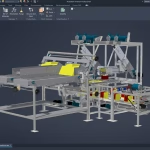Autodesk AutoCAD Essentials Training Course
Course Length: 16-Hours
- 8-Hours – 2 x 4-hour training sessions and basic setup
- Remote training over MS Teams
- Sessions are recorded and download links for each session are provide for future use
- Training for up to 1-3 People
- Sessions can start within 7 days upon ordering
- Flexible sessions (i.e. consecutive or Monday, Wednesday, Friday, etc.)
- Courses are private and topics can be customised to suit
- Includes Certificate of Completion
- Training manuals are additional $159 each for soft copy
Training Guide Contents
This AutoCAD: Essentials (Fundamentals – Part 1) training course is designed for those using AutoCAD with a Windows operating system. This guide is not designed for the AutoCAD for Mac software.
The objective of AutoCAD: Essentials (Fundamentals – Part 1) is to enable you to create, modify, and work with a 2D drawing in the AutoCAD software.
This course covers the essential core topics for working with the AutoCAD software. The course begins with learning the basic tools for creating and editing 2D drawings. It then continues to explore the tools used to annotate drawings by adding text, hatching, dimensions, and tables. More advanced tools, such as working with blocks and setting up layouts, are introduced to improve your efficiency with the software. Not every command or option is covered, because the intent is to show the essential tools and concepts, such as:
- Understanding the AutoCAD workspace and user interface
- Using basic drawing, editing, and viewing tools
- Organizing drawing objects on layers
- Using reusable symbols (blocks)
- Preparing a layout to be plotted
- Adding text, hatching, and dimensions
The AutoCAD: Essentials course is not recommended for users that have completed the AutoCAD: Fundamentals course, as the Essentials course makes up Part 1 of the Fundamentals course.
Prerequisites:
- A working knowledge of basic design/drafting procedures and terminology.
- A working knowledge of your operating system.
Contents
Chapter 1: Chapter 1: Getting Started with AutoCAD
- 1.1 Starting the Software
- 1.2 User Interface
- 1.3 Working with Commands
- 1.4 Cartesian Workspace
- 1.5 Opening an Existing Drawing File
- 1.6 Viewing Your Drawing
- 1.7 Saving Your Work
Chapter 2: Basic Drawing and Editing Commands
- 2.1 Drawing Lines
- 2.2 Erasing Objects
- 2.3 Drawing Vertical and Horizontal Lines
- 2.4 Drawing Rectangles
- 2.5 Drawing Circles
- 2.6 Undo and Redo Actions
Chapter 3: Projects: Creating a Simple Drawing
- 3.1 Create a Simple Drawing
- 3.2 Create Simple Shapes
Chapter 4: Drawing Precision in AutoCAD
- 4.1 Using Running Object Snaps
- 4.2 Using Object Snap Overrides
- 4.3 Polar Tracking at Angles
- 4.4 Object Snap Tracking
- 4.5 Drawing with Snap and Grid
Chapter 5: Making Changes in Your Drawing
- 5.1 Selecting Objects for Editing
- 5.2 Moving Objects
- 5.3 Copying Objects
- 5.4 Rotating Objects
- 5.5 Scaling Objects
- 5.6 Mirroring Objects
- 5.7 Editing with Grips
Chapter 6: Projects: Making Your Drawings More Precise
- 6.1 Schematic Project: Electronics Diagram
- 6.2 Architectural Project: Landscape
- 6.3 Mechanical Project: Using Polar and Tracking
- 6.4 Mechanical Project: Surge Protector
- 6.5 Mechanical Project: Satellite
Chapter 7: Organizing Your Drawing with Layers
- 7.1 Creating New Drawings with Templates
- 7.2 What Are Layers?
- 7.3 Layer States
- 7.4 Changing an Object’s Layer
Chapter 8: Advanced Object Types
- 8.1 Drawing Arcs
- 8.2 Drawing Polylines
- 8.3 Editing Polylines
- 8.4 Drawing Splines
- 8.5 Drawing Polygons
- 8.6 Drawing Ellipses
Chapter 9: Analysing Model and Object Properties
- 9.1 Working with Object Properties
- 9.2 Measuring Objects
Chapter 10: Projects: Drawing Organization and Information
- 10.1 Architectural Project
- 10.2 Mechanical Project
- 10.3 Civil Project
Chapter 11: Advanced Editing Commands
- 11.1 Trimming and Extending Objects
- 11.2 Stretching Objects
- 11.3 Creating Fillets and Chamfers
- 11.4 Offsetting Objects
- 11.5 Creating Arrays of Objects
Chapter 12: Introduction to Blocks
- 12.1 What Are Blocks?
- 12.2 Inserting Blocks Using the Blocks Palette
- 12.3 Inserting Blocks Using the Tool Palettes
- 12.4 Inserting Dynamic Blocks
- 12.5 Inserting Blocks Using the DesignCenter
Chapter 13: Projects: Creating More Complex Objects
- 13.1 Mechanical Project 1: Plate
- 13.2 Mechanical Project 2: Gasket
- 13.3 Mechanical Project 3: Plate
- 13.4 Mechanical Project 4: Rocker Arm
- 13.5 Architectural Project 1: Floor Plan
- 13.6 Architectural Project 2: Floor Plan
- 13.7 Civil Project: Parking Lot
Contact Us
If you would to discuss Autodesk training courses, please contact us by calling on 1800 490 514, by filling out the form or clicking the live chat in the bottom right-hand corner.



